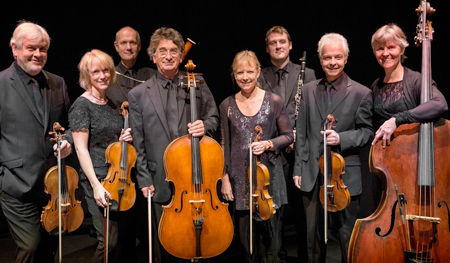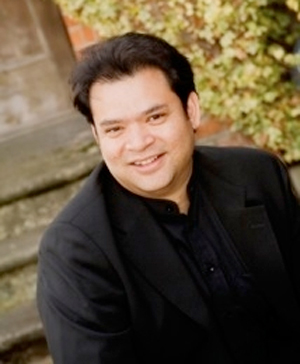by Daniel Hathaway

The ASMF chamber ensemble’s visit to Cleveland will be only the second stop on their current tour of North America. All told, the group will play fourteen concerts in nineteen days, beginning on October 5 in Dallas and ending on October 25 at Stanford University. In between, the musicians will perform in such far-flung cities as Clinton (NY), San Antonio, Houston, Memphis, Chicago, Columbus, Green Bay, Edmonton (Alberta), Reno, and Ashland (OR).
The Chamber Ensemble will be taking six works along for the tour, including Gioachino Rossini’s String Sonata in G, Wolfgang Amadè Mozart’s Divertimento in D, K. 126 and Horn Quintet in E-flat, K. 407, a chamber version of Richard Strauss’s Till Eulenspiegel’s Merry Pranks, Antonín Dvořák’s String Quintet in G, Op. 77, and Franz Schubert’s Octet in F, D. 803. They’ll play the Dvořák and Schubert works in Cleveland.
We reached principal violinist Harvey de Souza by telephone at his home in Lyon, France, to talk about the ensemble’s Cleveland performance.
“It’s a fantastic program,” de Souza said. “We haven’t toured with winds and strings for some time, and so we’re looking forward to that. The Schubert Octet, along with the quintet, is one of my favorites of all time. It’s a huge, 50-minute work, and to be quite honest, it’s a bit complicated coming up with pieces that can share a program with it. We thought long and hard about that. We really wanted to play the Dvořák, which we seldom get to perform because it requires a double bass — which is in itself an odd combination as far as quintets go. But this tour is a perfect opportunity to play the two works in the same evening. I’m really curious to see how it works, because generally the Dvořák is an program ender and we’ll be playing it first.”
De Souza said that if he’s lucky, he gets to play the Schubert Octet once or twice each year, and usually at festivals. During this tour, the ASMF Chamber Ensemble will feature the work on each of their fourteen performances “It will be interesting personally to see how one deals with performing it so many times in close proximity, “De Souza said. “It’s the kind of piece where you always find something new in it, but now it’ll be great to have the time to explore it in much greater detail.”

De Souza has gotten used to the vagaries of travel: he even has to board a plane to fulfil his London duties for the Academy of St. Martin in the Fields. “I now live in Lyon, where my wife is concertmaster of the orchestra. It’s actually quicker and more convenient for me to fly into London — it only takes an hour — than it is for my colleagues who live in England to drive into the city. That’s a scary thought!”
Earlier this week, De Souza joined seven of his fellow musicians for the Chamber Ensemble’s North American tour kickoff concert at King’s Place in London, the first concert hall to be built in the capital since the Barbican. “It’s a fabulous little hall with beautiful acoustics. London deserves another fantastic venue for chamber music besides the Wigmore Hall.” De Souza noted that everyone was on high artistic alert because the concert, which included the Rossini, the Mozart horn quintet, and the Schubert, was scheduled to be broadcast by the BBC.
Thanks to the magic of digital technology and the Internet, you can hear for yourself how the ASMF Chamber Ensemble’s September 30 concert in London sounded: the entire performance will be available on the BBC’s website for the next several weeks.
Published on ClevelandClassical.com October 1, 2015.
Click here for a printable copy of this article


